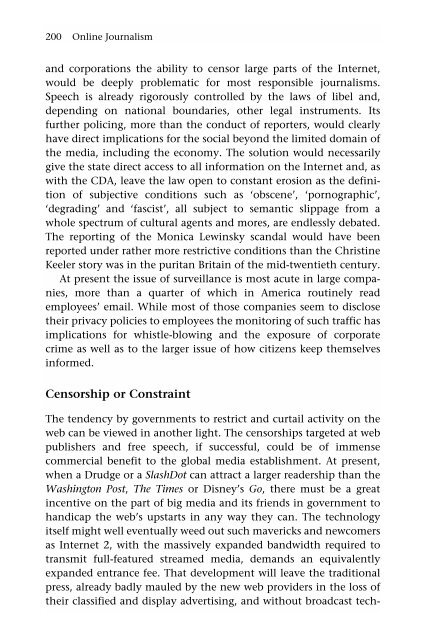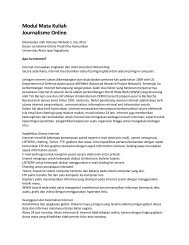Online Journalism - Ayo Menulis FISIP UAJY
Online Journalism - Ayo Menulis FISIP UAJY
Online Journalism - Ayo Menulis FISIP UAJY
Create successful ePaper yourself
Turn your PDF publications into a flip-book with our unique Google optimized e-Paper software.
200 <strong>Online</strong> <strong>Journalism</strong><br />
and corporations the ability to censor large parts of the Internet,<br />
would be deeply problematic for most responsible journalisms.<br />
Speech is already rigorously controlled by the laws of libel and,<br />
depending on national boundaries, other legal instruments. Its<br />
further policing, more than the conduct of reporters, would clearly<br />
have direct implications for the social beyond the limited domain of<br />
the media, including the economy. The solution would necessarily<br />
give the state direct access to all information on the Internet and, as<br />
with the CDA, leave the law open to constant erosion as the definition<br />
of subjective conditions such as ‘obscene’, ‘pornographic’,<br />
‘degrading’ and ‘fascist’, all subject to semantic slippage from a<br />
whole spectrum of cultural agents and mores, are endlessly debated.<br />
The reporting of the Monica Lewinsky scandal would have been<br />
reported under rather more restrictive conditions than the Christine<br />
Keeler story was in the puritan Britain of the mid-twentieth century.<br />
At present the issue of surveillance is most acute in large companies,<br />
more than a quarter of which in America routinely read<br />
employees’ email. While most of those companies seem to disclose<br />
their privacy policies to employees the monitoring of such traffic has<br />
implications for whistle-blowing and the exposure of corporate<br />
crime as well as to the larger issue of how citizens keep themselves<br />
informed.<br />
Censorship or Constraint<br />
The tendency by governments to restrict and curtail activity on the<br />
web can be viewed in another light. The censorships targeted at web<br />
publishers and free speech, if successful, could be of immense<br />
commercial benefit to the global media establishment. At present,<br />
when a Drudge or a SlashDot can attract a larger readership than the<br />
Washington Post, The Times or Disney’s Go, there must be a great<br />
incentive on the part of big media and its friends in government to<br />
handicap the web’s upstarts in any way they can. The technology<br />
itself might well eventually weed out such mavericks and newcomers<br />
as Internet 2, with the massively expanded bandwidth required to<br />
transmit full-featured streamed media, demands an equivalently<br />
expanded entrance fee. That development will leave the traditional<br />
press, already badly mauled by the new web providers in the loss of<br />
their classified and display advertising, and without broadcast tech-
















